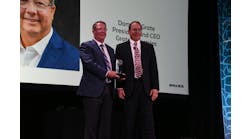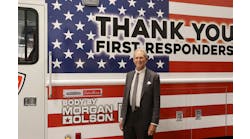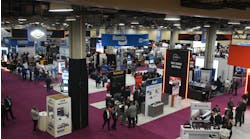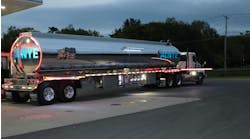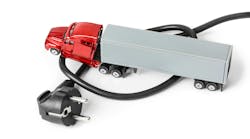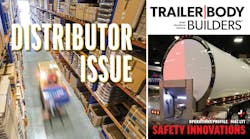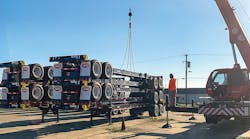U.S. intermodal container chassis producers now have a “level playing field,” following federal government investigations into unfair trade practices by Chinese chassis manufacturer CIMC Group.
A coalition of domestic manufacturers filed petitions in July 2020 charging that imports of chassis from China have materially injured the American container chassis industry. The petitioning companies include Cheetah Chassis Corp., Hercules Enterprises LLC, Pitts Enterprises Inc., Pratt Industries Inc. and Stoughton Trailers LLC.
In a unanimous vote Sept. 11 last year, the United States International Trade Commission determined there is “a reasonable indication” the U.S. trailer manufacturers are “materially injured” by the import of container chassis that are allegedly subsidized by the government of China and sold in the U.S. at “less than fair value.”
On April 13 the ITC made an affirmative final determination in the countervailing duty portion of the investigation, paving the way for the imposition of trade remedy orders.
"Today's vote by the Commission ensures that the domestic industry will finally be able to compete in a fairly traded market," Robert E. DeFrancesco, counsel to the Coalition, said at that time. "This is a significant victory for U.S. chassis producers and the hundreds of people displaced from U.S. chassis manufacturing jobs who have suffered significant injury as a result of unfairly traded imports from China. The Commission's determination paves the way for the domestic industry to continue its recovery in what will now be a level playing field in the U.S. chassis market."
The Commerce Department had already determined that Chinese chassis producers were being unfairly subsidized at a rate of 39.14%.
In the concurrent antidumping duty investigation, Commerce also determined that Chinese producers were dumping chassis and subassemblies into the U.S. at a margin of 188.05%, finalized May 15.
The investigation report was published May 28, and a final determination on the antidumping duty was scheduled to be issued June 28.
Once issued, the antidumping and countervailing duty orders will remain in effect for a minimum of five years, and there is an opportunity each year for duty rates to increase, retroactively, through the annual administrative review process, DeFrancesco noted. The coalition will now turn its attention to monitoring for any signs of duty evasion, absorption, transshipment or circumvention by foreign producers and importers, all of which are strictly illegal.
Chicken and egg
For a chassis costing $10,000, the countervailing duty and antidumping orders would assess charges of $3,914 and $18,805 respectively, on top of the Section 301 tariff of $2,500.
So it’s no wonder the top chassis buyers have fought the petition fiercely, arguing from the beginning that U.S. producers could not match the CIMC chassis in price or in quality, nor could they produce their chassis in sufficient numbers and on time.
The Truck Trailer Manufacturers Association filed a statement in support of the coalition, echoing claims of excess imports and price cutting.
“TTMA is sympathetic to the concerns of other industry players, including trucking companies,” TTMA said. “However, dumped and subsidized imports cannot be used to boost the profits of downstream companies in the industry, particularly when it threatens to put the domestic chassis manufacturing industry out of business. And it does.”
In providing post-hearing answers to commissioner questions in March, however, J.B. Hunt Transport submitted copies of email exchanges with U.S. chassis makers to assess whether they could supply the intermodal giant with trailers. While the emails were redacted from the public record, the filing says they demonstrate that J.B. Hunt has made numerous attempts to find a domestic producer that could meet its chassis requirements.
“J.B. Hunt notes that for every other product it purchases (axles, bearings, tires, etc.), vendors are constantly approaching J.B. Hunt on a continual basis. By contrast, the domestic suppliers of chassis are rarely proactive about pursuing J.B. Hunt’s business,” the filing states. “It has been many years since J.B. Hunt has heard from any of the petitioning manufacturers. It is difficult for J.B. Hunt to see how these suppliers can assert that they are injured if in fact they are unwilling to pursue such a large chassis purchaser as J.B. Hunt.”
Similar comments were filed by the Institute of International Container Lessors (the trade association of chassis and container lessors in the U.S.) and several of its members, such as TRAC Intermodal. They, too, submitted email exchanges with domestic chassis suppliers, and “over and over again” the U.S. manufacturers “make excuses” and “fail to keep promises.”
“The intermodal supply chain in the United States needs every chassis it can get,” the IICL statement reads. “Yet what is threatened by these investigations? Unfortunately, extremely high tariffs are threatened on the largest, most reliable, source of chassis supply into the United States (i.e., CIMC), and the U.S. chassis industry is not in a position to pick up the slack.”
The petitioner's Final Comments, however, argue the repeated “claim” that U.S. chassis suppliers have been unable or unwilling to serve more of the market is “the height of blaming the victim.”
“There was no inability or refusal to sell by U.S. producers; there was a refusal to buy fairly priced U.S. product by U.S. customers, because of the presence of unfairly traded imports in the market,” the filing says.
And coalition members understand the concerns of their once and future customers, as JP Pierson, president of Dorsey Intermodal (a division of coalition member Pitts Enterprises) explained to Trailer/Body BUILDERS. CIMC came into the market as intermodal shipments took off, and their market share took off with it—but “they did that through price.”
“We certainly can keep up, just like every other form of truck-trailer manufacturer in the United States can—if it makes sense from a business model standpoint,” Pierson said. “But when your competition is clearly subsidized and sells products not only under your cost, but substantially under your costs, it doesn't make sense to make the capital investments to increase production.
“That was the driving point behind the coalition. Our goal here was to not put CIMC out of business or anything else, but to level the playing field—to at least make it where it makes sense for us to go out and do what we're doing today, which is spending millions of dollars to increase production capacity, and modernize our plant—we're all-guns-blazing on increased production.”
Ed Gill, vice president of sales for Dorsey used to work for CIMC Intermodal (now CIE Manufacturing), the Chinese company’s North American chassis arm, and he pointed out that there’s “no argument” that CIMC makes a great product—but Pitts “can match it today,” and will exceed it going forward.
Gill explained that CIMC exported tens of thousands of chassis ahead of impending Section 301 Tariffs on goods from China, causing a “lag in the market” as that excess inventory was absorbed. And, once the 25% tariff took effect, intermodal equipment providers didn’t buy enough chassis to keep up with soaring demand “in hopes that an administration change” might eliminate the tariff.
So, he suggested, U.S. chassis manufacturers shouldn’t take all of the blame for any shortage as they ramp up production.
“Is there going to be a lag? Absolutely,” Gill said. “But now that they [CIMC] no longer control the market, that gives the coalition—as well as others—the opportunity to say, ‘Okay, I can start making those investments.’ So it is chicken-and-egg.”
Indeed, Dorsey is already making production projections and taking orders.
“Customers are signing up to get their name in production slots as fast as they can,” Pierson said.
Of note, the ITC determined that the operations of U.S.-based CIE Manufacturing during the period of investigation did not constitute sufficient production‐related activities for CIE to be considered a domestic producer.
A CIE representative declined to comment for this story.
